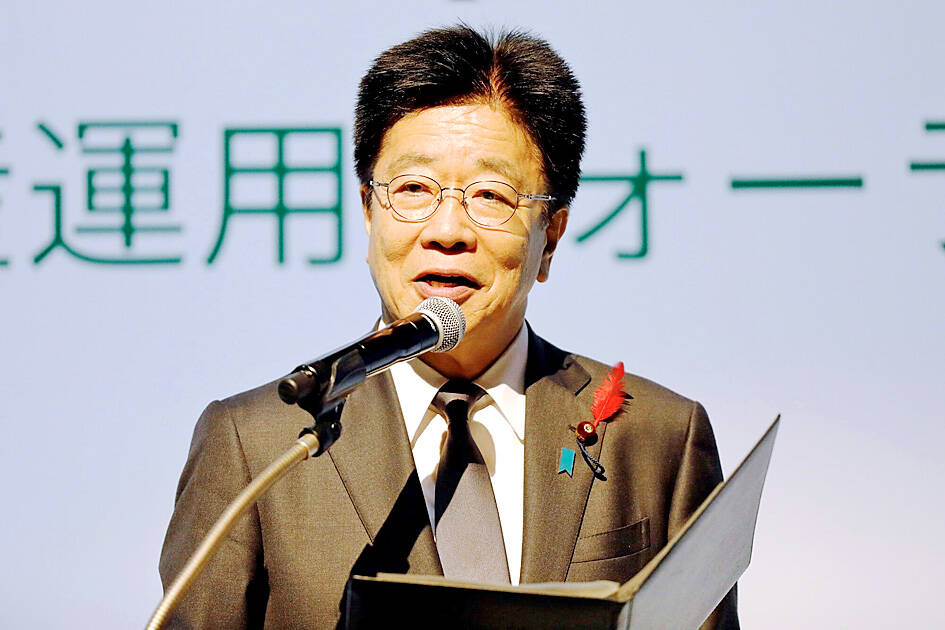Sudden moves in Japan’s currency hurt companies and households, and that impact requires close government scrutiny, newly appointed Japanese Minister of Finance Katsunobu Kato said in a group interview yesterday, following a pronounced slide in the yen in recent days.
“The problem is sharp currency fluctuations can have a negative impact on business activity and does not help citizens’ lives,” he said.
He also called for clear central bank communication and said that the government would quickly put together an economic package.

Photo: Kosuke Okahara, Bloomberg
Japan’s currency is trading at about ¥148.40 against the US dollar compared with a high of 141.66 just a week ago, as investors try to determine the direction of Ishiba’s new administration.
Strong US jobs data on Friday gave the currency an additional shunt as market players lowered their expectations for the size of US Federal Reserve interest rate cuts.
“We will carefully watch the impact of [foreign exchange reserves] forex moves on the Japanese economy and people’s lives,” Kato said.
Japan has already spent more than US$100 billion this year propping up the yen and would likely want to avoid having to intervene in markets again if possible.
Kato did not specify what action the government might take if the yen weakens further.
The Japan leadership race and comments from the new government have contributed to recent volatility in the yen.
Japan’s economy was not ready for higher interest rates, Ishiba said last week, prompting the currency to fall. Later he appeared to walk back some of those comments, suggesting he is still in the process of judging how best to communicate with markets.
Kato said he expects the Bank of Japan (BOJ) to communicate carefully with the market and manage policy appropriately toward its price goal.
The government and the central bank last week confirmed a joint accord that states their commitment to a 2 percent inflation target.
A BOJ rate hike at the end of July caught out some market participants and was seen contributing to a market meltdown that resulted in Japan’s worst-ever daily slide in stock prices. The bank meets at the end of this month and is widely expected to keep rates unchanged.
The specifics of monetary policy should be left to the central bank, Kato said.
To protect households from the impact of higher prices and to support growth, Ishiba last week ordered a package of economic measures and a supplementary budget to help fund it. The upcoming package is to include cash handouts for low-income households and regional economies.
“We want to put this together as soon as possible and take more concrete steps,” Kato said.
The additional spending would likely add to Japan’s debt burden, further straining the country’s already tough fiscal situation.
Japan’s debt reached 255 percent of GDP this year, the International Monetary Fund said.
Kato said that the government has to keep next year’s primary balance and fiscal health goal in mind while working on spending reform.
The government would continue to strengthen the competitiveness of the semiconductor industry, he added.
“The government’s stance has been [that] the chips sector is of key importance for economic national security,” Kato said. “We will keep following through on plans to support it.”

Intel Corp chief executive officer Lip-Bu Tan (陳立武) is expected to meet with Taiwanese suppliers next month in conjunction with the opening of the Computex Taipei trade show, supply chain sources said on Monday. The visit, the first for Tan to Taiwan since assuming his new post last month, would be aimed at enhancing Intel’s ties with suppliers in Taiwan as he attempts to help turn around the struggling US chipmaker, the sources said. Tan is to hold a banquet to celebrate Intel’s 40-year presence in Taiwan before Computex opens on May 20 and invite dozens of Taiwanese suppliers to exchange views

Application-specific integrated circuit designer Faraday Technology Corp (智原) yesterday said that although revenue this quarter would decline 30 percent from last quarter, it retained its full-year forecast of revenue growth of 100 percent. The company attributed the quarterly drop to a slowdown in customers’ production of chips using Faraday’s advanced packaging technology. The company is still confident about its revenue growth this year, given its strong “design-win” — or the projects it won to help customers design their chips, Faraday president Steve Wang (王國雍) told an online earnings conference. “The design-win this year is better than we expected. We believe we will win

Chizuko Kimura has become the first female sushi chef in the world to win a Michelin star, fulfilling a promise she made to her dying husband to continue his legacy. The 54-year-old Japanese chef regained the Michelin star her late husband, Shunei Kimura, won three years ago for their Sushi Shunei restaurant in Paris. For Shunei Kimura, the star was a dream come true. However, the joy was short-lived. He died from cancer just three months later in June 2022. He was 65. The following year, the restaurant in the heart of Montmartre lost its star rating. Chizuko Kimura insisted that the new star is still down

While China’s leaders use their economic and political might to fight US President Donald Trump’s trade war “to the end,” its army of social media soldiers are embarking on a more humorous campaign online. Trump’s tariff blitz has seen Washington and Beijing impose eye-watering duties on imports from the other, fanning a standoff between the economic superpowers that has sparked global recession fears and sent markets into a tailspin. Trump says his policy is a response to years of being “ripped off” by other countries and aims to bring manufacturing to the US, forcing companies to employ US workers. However, China’s online warriors